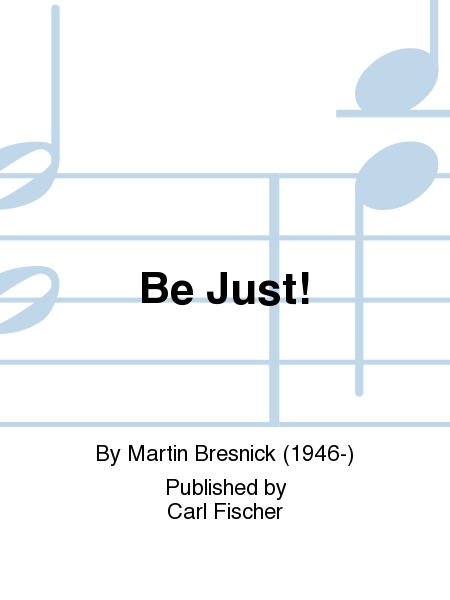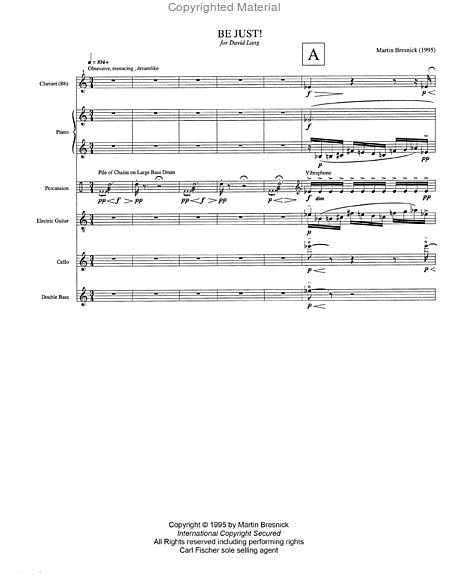Be Just!
Part of "Opere della Music Povera"
-
Ships in 2 to 3 weeks
Details
Description
SKU: CF.CY2756F
Part of "Opere della Music Povera". Composed by Martin Bresnick. Full score. With Standard notation. Composed 1995. 20 pages. Duration 4 minutes. Carl Fischer Music #CY2756F. Published by Carl Fischer Music (CF.CY2756F).ISBN 9780825875762. UPC: 798408075767. 8.5 x 11 inches.
We are pleased to make available the score of the seventh entry in Bresnick's 12-part series, Opere della Musica Povera ("works of a poor music"). Be Just! and Bucket Rider are both inspired by the writings of Kafka, but present very different moods and styles. See a YouTube performance of Be Just! by Bang on a Can, and listen to Bucket Rider at the Art of the States website.
The Bucket Rider and BE JUST! were both written in 1995 and are the seventh and eighth pieces from a group of 12 called Opere della Musica Povera, which means “works of a poor music.” The Bucket Rider is the title of a Kafka story about a man who is so poor and wasted away he can ride on his empty bucket to the coal dealer to beg for coal. In Kafka’s story, “In the Penal Colony”, an explorer goes to a prison camp that has an exquisite, aging apparatus that imprints on the flesh of a condemned man, by means of thousands of needles, whatever rule or commandment he has disobeyed. In this way, though the prisoner is ignorant of his sentence, he will learn it bodily. The officer in charge (who is also the judge) tells the explorer, “Guilt is never to be doubted,” and places the prisoner into the machine. The explorer is unimpressed. Infuriated, the officer changes the original sentence from “HONOR THY SUPERIORS!” to “BE JUST!” and climbs into the apparatus himself. Kafka had a very complex sense of the political. He was also a pretty weird guy, and I wanted to get some of that weirdness into the music. I give myself permission to do anything in my work so long as I have a palpable structural integrity that grants the various musical utterances plausibility. That’s been my goal, to get as free as I can about the means and genres in which I write, while holding them together with an internal coherence. The Opere della Musica Povera pieces reflect a politics of “Witness,” a kind of personal report on my state and the nation’s. There’s a bit of the Three Penny Opera in them, “an opera written with the splendor that only a beggar could imagine,” as Brecht said. That’s part of it - to create something out of very little material and make it seem splendid: an invitation to the necessary pleasures of austerity.


 Share
Share